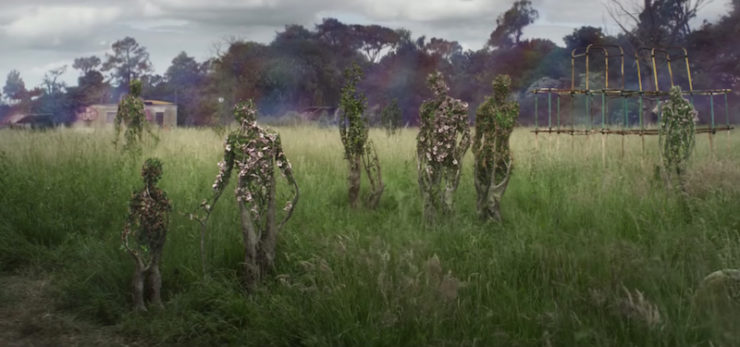I’ve been mulling Alex Garland’s Annihilation all weekend, looking at reactions to the film online; and between a torrent of tweets and other critics’ reviews, I think I figured out the thing that’s making it resonate for a certain segment of the population. This film has something very interesting to say about depression, and the fine line between suicidal ideation and self-destructive tendencies. I’m still not sure how I feel about it, personally, so I’m going to talk about it below to look at how the film handles some extremely heavy material. Be warned, this is a spoiler discussion of the film!
In what I consider Annihilation’s worst scene, anthropologist Sheppard (Tuva Novotny) tells biologist Lena (Natalie Portman) about why the women have all come on the expedition into Area X, even knowing that it’s probably a suicide mission. We already know that Lena is there because she is grief-stricken over her husband, and has seemingly decided that he joined a previous Area X mission to escape her after she had an affair. Psychologist Ventress (Jennifer Jason Leigh) is a mystery. EMT Thorensen (Gina Rodriguez) is an addict. Sheppard herself has never recovered from the loss of her daughter. And the physicist, Radek (Tessa Thompson)? Sheppard points out that she always wears long sleeves to hide her scars. Lena seems startled by the idea that Radek wanted to die, but Sheppard thinks maybe she was trying to feel alive. The reason I say this is the worst scene is just that it’s a wad of lumpy exposition in a film that otherwise tends toward quiet contemplation and brutal shock. It pushed me away from the characters, where I would have preferred to infer the details, from seeing Sheppard’s attention to a toy that she carries as a talisman of her daughter, to witnessing Thorensen’s DT jitters, to watching Lena noticing Radek’s scars. I think that would have built the sense of melancholy into the structure of the film, rather than it being delivered as a packet of information.
That said, I think this information in turn led to the best element of the film. Radek is the one who figures out the true nature of the Shimmer. Not what caused it, but what it is: a refraction of reality. A recombining of reality. A metamorphosis. She’s the physicist of the group. At the opening, she was the one who seemed shy upon meeting Lena. She was the one who panicked when she realized that her tech didn’t work inside the Shimmer—to the extent that Sheppard, the anthropologist, had to remind her to use the sun as a navigational guide. (A social scientist correcting a physicist? I flinched in the theater.) But in the end she’s the only one who comes to a sense of true acceptance of the Shimmer.
She says that Ventress wants to face the Shimmer, and Lena wants to fight it, but Radek doesn’t want to do either of those things. After a life that led to enough depression or deadness that she sliced her arms up, either because she wanted to die or because the only way she could feel alive was to see her own blood, she found a third path—a thing that was neither life in our reality nor death. She allows the Shimmer to transform her, submits to it in a way none of the others do, and the way it manifests is to sprout plants and flowers from the scars of her suicide attempts.

Of all the beautiful/horrific imagery in this film, this was the moment that made me gasp aloud. Because here the scars of a suicide aren’t vilified, or covered in sleeves or tattoos, or the cause for shock on the part of a non-suicidal character: They are the soil growing a new kind of life, a path that opts out of the violence the others seem to see as inevitable.
I’ll note, as gently as I can, that the filmmakers chose to cast Tessa Thompson, a Black woman, as Radek. There aren’t too many Black female physicists in the world, and, statistically, Black women are the group that receives the least mental health support in the US. They are the most likely to take on extreme amounts of emotional and intellectual labor (just look at who’s leading most of the justice movements in this country, who has, historically, done the most groundwork, and paperwork, and thankless crap work, for the feminist and civil rights movements) but at the same time not to receive mental care. So, if we take that into account, what we’re seeing here is a shy, gentle Black woman, who chose a profession dominated by white men, who has tried to kill herself at least once, who finds a way out of the binary of life and death, and allows herself to transform into something entirely new.
…I’m still not sure how to feel about it? Obviously there are lots of ways to commit suicide, but I don’t think the film intends for us to read Radek’s fate as a self-destructive act. It’s also frightfully easy to put a character on screen, slap some scars on her arms, and assume that your audience will not only do the work to fill in her emotional life, but also call the filmmakers “brave” and “unflinching” while they do it. Plenty of movies do just that, using lazy imagery to show us depression or suicidal ideation without doing the emotional work to help us understand the character. If I’m right, Annihilation has found a way though that trope, and subverted it, in order to speak directly to those who might most need the emotional connection. And I think I love it? But I can also see why people might be violently opposed to it. I’d love to hear what you all think in the comments.
Leah Schnelbach would kind of love to grow flowering antlers. Can she just do that here, without having to go to a rapidly-mutating Florida? Come talk to her on Twitter!










